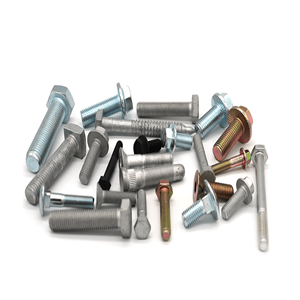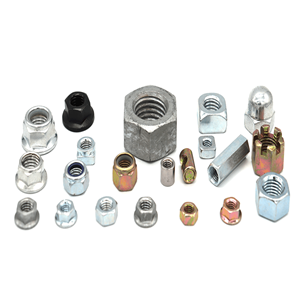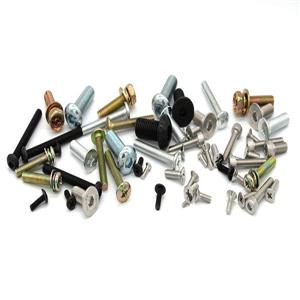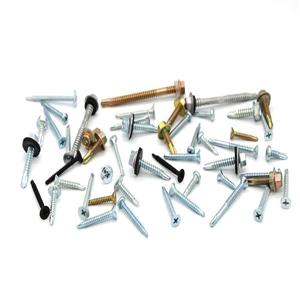Inconel alloys introduction of fastener product materials
Inconel alloys are generally known for their resistance to oxidation and their ability to maintain their structural integrity in high temperature atmospheres. There are several Inconel alloys that are used in applications that require a material that does not easily succumb to caustic corrosion, corrosion caused by high purity water, and stress-corrosion cracking. While each variation of Inconel has unique traits that make it effective in different circumstances, the majority of the alloys are used frequently in the chemical industry.
Inconel 601 is a nickel-chromium alloy that has additions of aluminum. These additions increase its resistance to oxidation and various forms of corrosion. This has made Inconel 601 a common material in heat treating equipment, furnaces, and gas-turbine components. Inconel 690 has a similar makeup to 601, but it is considered a high chromium-nickel alloy. The high chromium content in 690 makes it especially resistant to corrosion that occurs from salts, oxidizing acids, and other elements commonly found in aqueous environments.
Inconel 625 differs from many of the other Inconel alloys because its composition includes substantial amounts of nickel, chromium, and molybdenum. It also has an addition of niobium. The result is an alloy that possesses high levels of strength without ever having to go through a strengthening heat treatment. Inconel 625 is especially effective at resisting crevice corrosion, making it a chosen material in the aerospace and marine engineering industries.
Inconel 600
Inconel 600 is a nickel-chromium alloy that offers high levels of resistance to a number of corrosive elements. In high-temperature situations, Inconel 600 will not succumb to chloride-ion stress-corrosion cracking or general oxidation. The alloy is also resistant to caustic corrosion and corrosion caused by high purity water.
Its ability to withstand corrosion in a variety of forms has made Inconel 600 the perfect alloy for use in furnace components and chemical processing equipment. However, Inconel 600 is also used effectively in the food industry and in nuclear engineering, because it will maintain its structure in applications that would cause permanent, irreversible distortion to other alloys.
It is possible to order Inconel 600 from several leading distributors on the market. However, as is the case with many rare and specialty alloys, you generally won't have a lot of ordering options. You will find that most companies simply do not carry Inconel 600 in a variety of forms. If you are interested in custom projects and designs involving Inconel 600, you will find it even harder to locate a distributor who can help you.
Inconel 601
Like Inconel 600, Inconel 601 offers resistance to various forms of high-temperature corrosion and oxidization. However, unlike 600, this nickel-chromium alloy has an addition of aluminum. This addition allows it to demonstrate high mechanical properties even in extremely hot environments.
Inconel 601's ability to stave off the strain that would result in many alloys when exposed to high temperatures has led to its use in furnaces and heat treating equipment like retorts and baskets. You will also find Inconel 601 in gas-turbine components and petrochemical processing equipment.
Inconel 625
Inconel 625 is the rare alloy that gains strength without having to undergo an extensive strengthening heat treatment. Inconel 625 is a nickel-chromium-molybdenum alloy with an addition of niobium. The niobium reacts with the molybdenum, causing the alloy's matrix to stiffen and increasing its strength level. Like most Inconel alloys, Inconel 625 has high resistance to a number of corrosive elements. In fact, it can withstand harsh environments that would all but destroy other alloys. It is particularly effective when it comes to staving off crevice corrosion and pitting. Inconel 625 is a versatile alloy that requires less work than most. It is effectively used in the aerospace industry, marine engineering, the chemical and energy industries, and much more.
When you go to order Inconel 625, you might have trouble finding exactly what you are looking for. The first problem you are likely to encounter is that many companies simply do not carry Inconel 625 or any other Inconel alloy. If you do locate a distributor, you may find that you have very limited options regarding shape and quantity.
Inconel 690
The Inconel alloys consist mainly of a group of metal alloys that offer high resistance to corrosive materials and environments. Inconel 690 falls into this category. However, unlike some of the other alloys in the group, it is a high-chromium and nickel alloy. The high-chromium element of the alloy gives it a particularly strong resistance to corrosion that occurs in aqueous atmospheres. Generally, this corrosion occurs as oxidizing acids and salts break a material down. Along with its ability to resist these stresses, Inconel 690 can also withstand the sulfidation that takes place at extremely high temperatures.
Along with its resistance to corrosives, Inconel 690 possesses strong metallurgical stability which allows it to maintain structural integrity in a wide range of applications. It also has a high level of strength and possesses fabrication traits that enable it to be used in a number of different settings. All of these aspects of Inconel 690 have made it a versatile alloy that has found use in a range of industries.
When you are in the market for Inconel 690, you will find your best chances of getting exactly what you need lie with companies that offer a variety of shapes and designs of the alloy. Unfortunately, this is not common among many of the leading distributors in the industry.
Inconel 718
Inconel 718 possesses the resistance to corrosive elements that are common among Inconel alloys. However, Inconel 718 differs from other alloys in its "family" in structure and response. 718 is a precipitation-hardenable nickel-chromium alloy. It contains substantial levels of iron, molybdenum, and niobium as well as trace amounts of titanium and aluminum.
Its makeup allows for an ease of welding that is not matched by the majority of Inconel alloys. It also allows Inconel 718 to combine anti-corrosive elements with a high level of strength and flexibility. Inconel 718 is particularly resistant to post-weld cracking, and it can maintain its structure in both high-temperature and aqueous environments. In fact, it will maintain superb creep-rupture strength at temperatures as high as 1,300?F.
The unique qualities of Inconel 718 have caused it to be used in industries and applications where other Inconel alloys simply would not be effective. You will find it in nuclear reactors, spacecraft, and rocket motors. However, it does have more common applications, as well. It can be very effective in tooling and gas turbines. There is also a version of the alloy (718 SPF) that is used specifically for super-plastic forming.
Inconel 722
Inconel 722 is a nickel-chromium alloy that shares many of the same properties as other Inconel alloys. It demonstrates a high level of resistance to various forms of corrosion. It also has the capacity to remain effective at extremely high temperatures. Inconel 722 can withstand the stress caused by several types of acids, which has made it a common metal in the chemical industry.
Finding Inconel 722 in any form can be difficult. Even many of the companies that do carry Inconel alloys focus more on Inconel 600. Companies that carry the full range of the alloys will often have a limited stock or reduced options when it comes to shaping.
Inconel 903
Inconel 903 is part of a family of alloys that are known for their resistance to corrosion caused by a wide range of stresses in a variety of settings. Many Inconel alloys can remain effective in high temperature and aqueous atmospheres. Most are resistant to multiple acids, as well, so they are used regularly in the petrochemical industry.
In order to fully explore the material properties of Inconel alloys or other hard-to-find metals, you can turn to the online database established by All Metals & Forge. This database not only gives you access to a metal or alloy's composition, but it provides in-depth information on a certain material's ability to withstand stresses in a range of environments. You will be able to determine at what temperatures Inconel 903 remains viable, and you can view its level of elasticity, malleability, and more.
Along with the material data, you can also look into Inconel 903's applications. Within each application you can find the metal's yield point, as well. For instance, Inconel 903 is used in high-temperature situations, but you still need to know the range of temperature at which it can remain effective. If you are not looking for specific numbers, you can use the database to help you answer general metallurgical questions.
Inconel Alloys
There are only a handful of metals companies that carry a line of Inconel alloys. Furthermore, the majority of distributors that do maintain a stock of Inconel alloys do not offer many options when it comes to shape and design. All Metals & Forge has worked with companies in almost every industry and has been able to provide Inconel alloys that suit those companies' specific needs.




